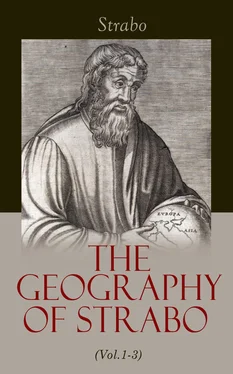6. Further, endeavouring to support the opinion that it is in accordance with natural philosophy to reckon the greatest dimension of the habitable earth from east to west, he says that, according to the laws of natural philosophy, the habitable earth ought to occupy a greater length from east to west, than its breadth from north to south. The temperate zone, which we have already designated as the longest zone, is that which the mathematicians denominate a continuous circle returning upon itself. So that if the extent of the Atlantic Ocean were not an obstacle, we might easily pass by sea from Iberia to India, 464still keeping in the same parallel; the remaining portion of which parallel, measured as above in stadia, occupies more than a third of the whole circle: since the parallel drawn through Athens, 465on which we have taken the distances from India to Iberia, does not contain in the whole 200,000 stadia.
Here too his reasoning is incorrect. For this speculation respecting the temperate zone which we inhabit, and whereof the habitable earth is a part, devolves properly on those who make mathematics their study. But it is not equally the province of one treating of the habitable earth. For by this term we mean only that portion of the temperate zone where we dwell, and with which we are acquainted. But it is quite possible that in the temperate zone there may be two or even more habitable earths, especially near the circle of latitude which is drawn through Athens and the Atlantic Ocean. After this he returns to the form of the earth, which he again declares to be spheroidal. Here he exhibits the same churlishness we have previously pointed out, and goes on abusing Homer in his old style. He proceeds:
7. “There has been much argument respecting the continents. Some, considering them to be divided by the rivers Nile and Tanais, 466have described them as islands; while others suppose them to be peninsulas connected by the isthmuses between the Caspian and the Euxine Seas, and between the Erythræan Sea 467and Ecregma.” 468He adds, that this question does not appear to him to be of any practical importance, but rather, as Democritus observed, a bone of contention for angry litigants. Where there are no precise boundary marks, columns, or walls, as at Colyttus and Melitè, 469it is easy for us to say such a place is Colyttus, and such another Melitè; but not so easy to show the exact limits: thus disputes have frequently arisen concerning certain districts; that, for instance, between the Argives and Lacedæmonians concerning [the possession of] Thyrea, 470and that between the Athenians and Bœotians relative to Oropus. 471Further, in giving names to the three continents, the Greeks did not take into consideration the whole habitable earth, but merely their own country and the land exactly opposite, namely, Caria, which is now inhabited by the Ionians and other neighbouring tribes. In course of time, as they advanced further and daily became acquainted with new countries, this their division came to be general.”
I take this last part first, and (to use Eratosthenes’ own words, not those of Democritus) willing to pick my bone of contention, inquire, whether they who first made the division of the three continents were the same persons as those who first desired to distinguish their own land from that of the Carians opposite, or whether they were only acquainted with Greece, Caria, and some few other adjoining countries, and not with Europe, Asia, or Africa; but that others who followed them, and were able to write a description of the habitable earth, were the real authors of the division into three continents. How did he know that these were not the men who made this division of the habitable earth? And he who divided the earth into three parts, giving to each portion the name of “continent,” could he not form in his mind a just idea of that taken as a whole, which he had so parcelled out. But if indeed he were not acquainted with the whole habitable earth, but merely made a division of some part thereof, pray what portion of that part did he denominate Asia, or Europe, or simply continent? Such talk is altogether nonsense.
8. The reasoning of Eratosthenes, however, is still more absurd, when he declares that he sees no advantage in being acquainted with the exact boundaries of countries, and then cites the example of Colyttus and Melitè, which prove just the contrary of his assertion. Surely if a want of certainty respecting the boundaries of Thyrea and Oropus gave rise to war, a knowledge of the limits of different districts must be of practical importance. Will he tell us that the boundaries of districts, or the limits of kingdoms, may be of some service, but when applied to continents it is carrying the matter too far. We reply, it is of equal consequence here. Suppose a dispute between two powerful princes, one claiming the possession of Asia and the other of Africa, to which of these should Egypt, I mean the country called Lower Egypt, appertain. Will any one pass over such cases on account of their rarity? By no means. It is acknowledged by every one that the limits of each continent ought to be defined by some notable boundary, indicated by the configuration of the whole habitable earth. In following out this principle, we should not be very particular if they who determine boundaries by the rivers leave some districts undefined, since the rivers do not reach from sea to sea, nor leave the continents altogether as islands.
9. At the close of the book Eratosthenes blames the system of those who would divide all mankind into Greeks and Barbarians, and likewise those who recommended Alexander to treat the Greeks as friends, but the Barbarians as enemies. 472He suggests, as a better course, to distinguish them according to their virtues and their vices, “since amongst the Greeks there are many worthless characters, and many highly civilized are to be found amongst the Barbarians; witness the Indians and Ariani, 473or still better the Romans and Carthaginians, whose political system is so beautifully perfect. Alexander, considering this, disregarded the advice which had been offered him, and patronized without distinction any man he considered to be deserving.” But we would inquire whether those men who thus divided the human race, abandoning one portion to contempt, and exalting to dignity the other, were not actuated to this because they found that on one side justice, knowledge, and the force of reason reigned supreme, but their contraries on the other. Alexander did not disregard the advice tendered him, but gladly embraced and followed it, respecting the wisdom of those who gave it; and so far from taking the opposite course, he closely pursued that which they pointed out.
Table of Contents
In the Second Book, having proposed for discussion the [opinions] of Eratosthenes, he examines and refutes whatever that writer may have incorrectly said, determined, or laid down. He likewise brings forward many statements of Hipparchus, which he disproves, and finishes with a short exposition or synopsis of the whole subject, namely, geographical knowledge.
Table of Contents
1. In the Third Book of his Geography Eratosthenes furnishes us with a chart of the habitable earth. This he divides into two portions, by a line running from east to west parallel to the equator. He makes the Pillars of Hercules the boundary of this line to the west, and to the east the farthest ridges of those mountains which bound India on the north. From the Pillars he draws the line through the Strait of Sicily, 474and the southern extremities of Peloponnesus and Attica, to Rhodes and the Gulf of Issus. 475He says, “Through the whole of this distance the line mentioned is drawn across the sea 476and adjacent continents; the whole length of the Mediterranean as far as Cilicia extending in that direction. Thence it runs nearly in a straight line along the whole chain of the Taurus to India. The Taurus continuing in a straight line from the Pillars divides Asia through its whole length into two halves, north and south. So that both the Taurus and the sea from the Pillars hither 477lie under the parallel of Athens.”
Читать дальше












![Anne Blunt - A Pilgrimage to Nejd, the Cradle of the Arab Race. Vol. 2 [of 2]](/books/750183/anne-blunt-a-pilgrimage-to-nejd-the-cradle-of-the-thumb.webp)